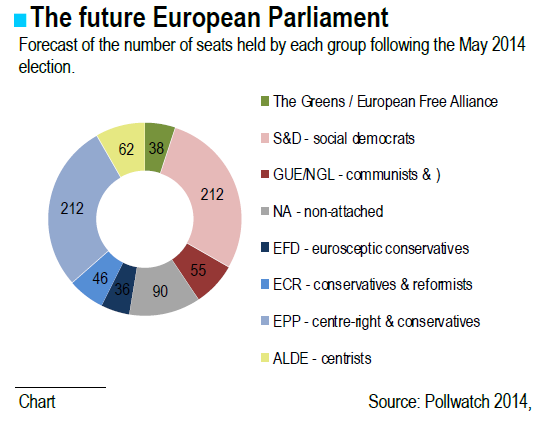European parliamentary elections will be held between 22 and 25 May in the European Union’s 28 member states. A look at the powers at play…
S&D, EPP: balance of powers…
The latest polls place the Social-Democrats (S&D) and the European People’s Party (EPP) neck-and-neck. According to Pollwatch 20141, the S&D will win the elections in Italy, the UK, Romania, Portugal and Sweden, while the EPP is in the lead in Germany, France, Hungary and Ireland, among others. For the moment, the polls do not show a clear winner in Spain yet, while the Polish election could be won by the conservative right-wing party, the main opposition party to the ruling centre-right coalition and a member of the conservative ECR parliamentary group in Brussels. On the whole, S&D and EPP, the two biggest parliamentary groups, will obtain 212 seats each in the next hemicycle, 28.2% of the total (or a combined 56.4%).
The European Parliament (EP) makes its own forecasts via TNS. Its predictions gave the EPP a slight lead in early April, with 214 seats vs. 208 for the S&D. Both polling institutes agree that about 60 seats will go to the parties currently making up the Alliance of Liberals and Democrats for Europe (ALDE) and a little over 50 seats to the communists and anti-liberals of the European United Left – Nordic Green Left (GUE-NGL). On the whole, both Pollwatch and EP agree that based on current polls, the European hemicycle will apparently lean to the right after the 22-25 May elections, but that an alliance between the EPP, ALDE and the conservative ECR would still fall short of an absolute majority in Parliament (42% of votes, vs. 54% currently).
Unaligned parties: Parliament’s third biggest force?
As we have already pointed out in the past, these elections are drawing attention because of fears of a strong surge in the scores of protest and/or euro-sceptical parties. Recent forecasts bolster this scenario. According to these projections, EFD (Europe of Freedom & Democracy), the group comprised of deputies from nationalist parties like the UK’s UKIP and Italy’s Northern League, will conserve more or less the same number of seats (between 29 and 36 seats depending on the source, compared to 31 currently). In contrast, the far left GUE-NGL group, which includes MEPs from Greece’s Syriza, France’s Front de Gauche and Germany’s Die Linke, will gain between 15 and 20 seats (from 31 currently up to 51 according to forecast).
Lastly, the polls suggest a sharp increase in the number of unaligned parties, mainly MEPs from the most extreme parties, which lack the capability or desire to form alliances with other parties. According to Pollwatch, the number of unaligned parties could triple following the May elections, from 32 to 90 MEPs, covering more than 16 nationalities. Theoretically, this would make it the hemicycle’s third biggest power. According to EP estimates, the number of MEPs elected from parties already ranking among the unaligned in the current legislature (i.e. MEPs from France’s Front National, the Dutch PW and Austria’s FPO) would increase from 32 to 38 seats. The number of MEPs from newly arriving parties (like Italy’s 5-Star Movement and Germany’s anti-euro AfD, which Pollwatch predicts will win 6 seats) could reach 66 MEPs. Their future affiliation has not been determined yet.

Pollwatch, the number of unaligned parties could triple following the May elections, from 32 to 90 MEPs, covering more than 16 nationalities. Theoretically, this would make it the hemicycle’s third biggest power. According to EP estimates, the number of MEPs elected from parties already ranking among the unaligned in the current legislature (i.e. MEPs from France’s Front National, the Dutch PW and Austria’s FPO) would increase from 32 to 38 seats. The number of MEPs from newly arriving parties (like Italy’s 5-Star Movement and Germany’s anti-euro AfD, which Pollwatch predicts will win 6 seats) could reach 66 MEPs. Their future affiliation has not been determined yet.
Although very diverse, these unaligned MEPs will obviously form a major block of power. Will they remain unaligned or can we expect to see the formation of new alliances after the elections? To form a European Parliamentary group, and thus to acquire some power of influence, at least 25 MEPs from at least 7 different nationalities must join forces. The polls predict that the nationalist parties of the EFD could seek agreements with new arrivals to meet the nationality requirement2. The formation of a far right group cannot be totally ruled out either, although in the past, these parties have shown little ability to work together over the long term3. In the end, the European Parliament’s best protection against these powers is the lack of interest they have shown in European issues.
BY Frédérique CERISIER
